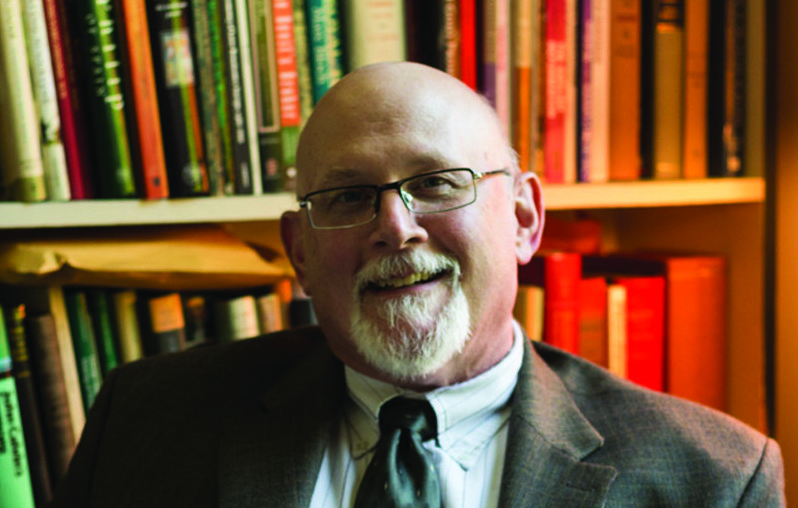To be Alone with God and Books
Walking into Dr. Gary Jenkins’ office, my gaze immediately fixated on two items hanging on his wall. The first was a painting of Elizabeth I of England. Later on in our interview, Dr. Jenkins would point to the Queen during one of his fascinating digressions. The second item, arguably no less significant, was a map entitled “Pub Stops of Oxford,” a gift from a dear student after her return from studying abroad.
Jenkins lit up when he talked about Oxford, and specifically the libraries of Oxford, his favorite place to be besides church. “There’s something special about being alone with books,” Jenkins mused, especially the great books that invite us to enter into the conversation that humans have engaged in for centuries. Participation in this conversation is at the heart of Dr. Jenkin’s vision for learning. He’s been teaching history at Eastern since 1994, and recently, Dr. Jenkins has helped create a conversation about Orthodox Christianity through a new on-campus Orthodox Institute.
When asked to describe his spiritual journey, Dr. Jenkins responded, “I was reared fundamentalist and I read myself into Calvinism in college.” After earning his Bachelor of Arts degree in religion from Manahath College, he attended the Seminary of the Reformed Episcopal Church for his Master of Divinity degree and was ordained in the Presbyterian church.
By 1986, he was reading Orthodox writers, finding the ideas both interesting yand strange. While studying at the University of Maryland for his Master of Arts in medieval European history, his mentor and advisor was Aristeides Papadakis, a Greek Orthodox scholar. Dr. Jenkins tried to incorporate some ideas from Orthodoxy while remaining Presbyterian. But in 1990, “I took a shot to the midsection, reading Barth, realizing that in reading him, I was not what he said I should be in the sense of being an evangelical.”
In 1995, as he was working on his dissertation, Jenkins had an epiphany while listening to a lecture by theologian William Abraham. The lecture changed the nature of his dissertation and confirmed to Jenkins that he could no longer be Presbyterian. Four years later, during the summer of 1999 he began the process of becoming Orthodox. He was received into the Orthodox Church on June 24, 2000, on the feast day of St. John the Baptist.
Dr. Jenkins says what draws him to Orthodoxy is that it gives him the peace that surpasses mere certitude. As to why he stays, Orthodoxy is who he is: ”there is no other place to go. The grammar, the rhetoric, and the logic of Orthodoxy became the only way that I could think.”
Our conversation stilled and we paused to enjoy the silence. This provided counterpoint to our discussion of music. Dr. Jenkins thoroughly enjoys Renaissance and Baroque music and composers such as Bach and Vivaldi. When Thomas Tallis–a composer of beautiful sacred music–was mentioned, Dr. Jenkins opened Youtube and played “Spem In Alium,” a staggering choral piece written for forty voices. For a time, we sat quietly, both enjoying the detailed harmonies, then continued, our voices soft to allow space for the singing in the background.
I asked Dr. Jenkins to describe some influential figures in his life. He was hesitant at first to name anyone because he said there were so many he could speak of, and to name only a few would seem to dishonor the many others. I was struck with profound wonder listening to Dr. Jenkins describe how others sowed into his life.
I decided to end the interview on a lighter note. “What movies do you like?” I asked. All sense of quiet reverence was shattered. “Nothing by Peter Jackson,” Jenkins uttered emphatically. He does enjoy watching Marvel films with his daughter, along with the works of the Cohen brothers, particularly “The Big Lebowski.” Pop culture aside, he appreciates older films. “Just think, a film where a man loves a woman but is willing to give her up for a greater cause,” Jenkins said, describing his favorite film, “Casablanca,” “What a picture of virtue!”
The word virtue is a great word of summary for who Dr. Jenkins is, in the context of his Orthodox faith and in the context of his teaching here at Eastern. Oh, and books, definitely books, especially if those books are found in Oxford’s quiet libraries.
Image courtesy of Matt Wolek / The Waltonian

